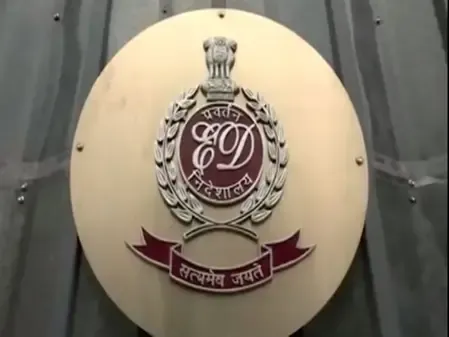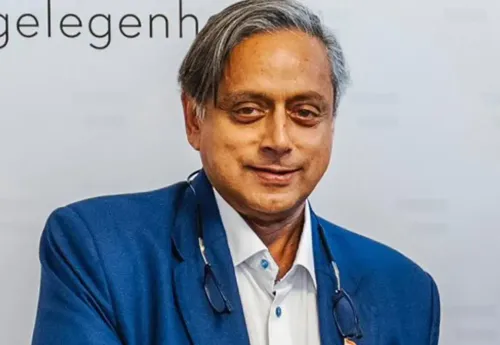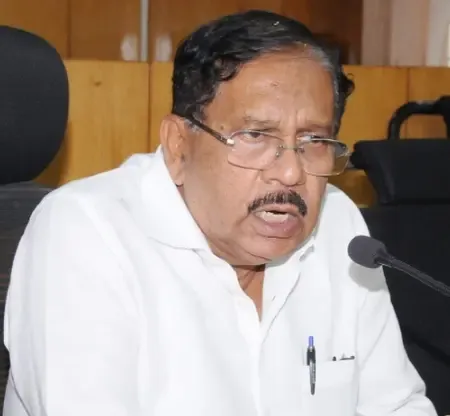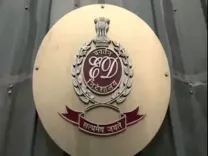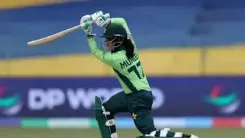Is MP CM Yadav's Vision for Agriculture Reform Ambitious Enough?
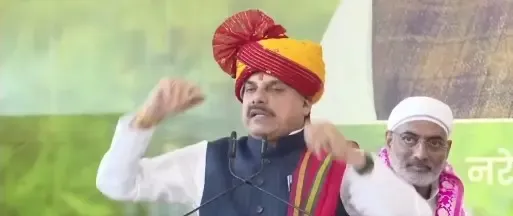
Synopsis
Key Takeaways
- Ambitious goal to double irrigated land by 2028-29.
- Fast-tracked compensation for soybean farmers.
- Revival of Bhavantar Bhugtan Yojana for price compensation.
- Highest wheat procurement price in the nation.
- Focus on sustainable agricultural practices.
Bhopal, Oct 18 (NationPress) The Chief Minister of Madhya Pradesh, Mohan Yadav, announced a bold initiative on Saturday, aiming to double the state's irrigated agricultural land to one crore hectares by the year 2028-29, as reported by officials.
During a gathering at his official residence, CM Yadav emphasized the swift disbursement of crop damage compensation, particularly for soybeans devastated by excessive rainfall and yellow mosaic virus, highlighting the BJP government's commitment to farmers.
"Evidence is available on Google and mobile platforms," he remarked, while denouncing the dependency on diesel pumps due to unreliable electricity supply.
Claiming that Madhya Pradesh holds the second position in national wheat production, the Chief Minister stated that the BJP-led government aims to procure 80 lakh tonnes and, through enhanced irrigation, these reforms promise swift relief as well as long-term agricultural sustainability, potentially making 2025 a pivotal year for the state's farming landscape.
Addressing farmers during the harvest season, CM Yadav acknowledged a significant transformation in agricultural support, crediting Prime Minister Narendra Modi's vision for reshaping the farmer welfare ecosystem.
He pointed out projects like the Teria Nala Dam and Sondwa Micro Lift as key developments.
In a critique of the Congress party for neglecting farmer welfare, Yadav's speech blended determination with pride, lauding farmers as the backbone of the nation.
"You have altered the system," he stated, calling for applause for the efficient delivery of assistance.
"Historically bogged down by bureaucratic delays in assessing damage after the season, the new system guarantees that funds reach farmers' bank accounts even before harvests are completed," he explained.
In October alone, the state has disbursed Rs 653 crore to 8.84 lakh farmers across 3,554 villages, covering losses on 6.53 lakh hectares. From Shivpuri to remote districts, soybean farmers affected by the virus are receiving direct transfers, eliminating the outdated waiting period.
He mentioned the revival of the Bhavantar Bhugtan Yojana, approved on October 14, which compensates producers for the difference between market rates and the minimum support price of Rs 5,328 per quintal.
"The registration process through the Madhya Pradesh Kisan app and e-Upaj portal began on October 10, allowing sales from October 24, 2025, to January 15, 2026, with the government covering shortfalls for eligible farmers," he added.
"This is not merely policy; it is an emotion," CM Yadav remarked.
Switching focus to wheat, he announced a procurement price of Rs 2,600 per quintal, the highest in the country for the 2025-26 rabi season — a Rs 175 bonus above the Union government's MSP of Rs 2,425.
"Launched in March across 4,000 mandis, procurement has exceeded 2.7 million tonnes by mid-April, positioning Madhya Pradesh as the second-largest contributor to the Central share after Punjab," he noted.
Reflecting on his government's election promises, CM Yadav highlighted how initial increases to Rs 2,425 advanced to Rs 2,600 following consultations with farmers, surpassing competitors.
"We committed to Rs 2,700; we're delivering incrementally," he said, contrasting this with historical lows for wheat — Rs 100 per quintal in 1956, Rs 500 by 2005.
Commending BJP leaders such as Uma Bharti, Babulal Gaur, and Shivraj Singh Chouhan for promoting "farmer's sons" into leadership positions, he criticized the Congress for failing to elevate themselves to the Chief Ministerial post.
"What can't a farmer's child achieve?" he asked, depicting cultivators as "pure-hearted sons of Balarama", toiling under various adversities to feed the nation, finding joy in the plough over arms. However, CM Yadav acknowledged broader challenges. Madhya Pradesh, bordered by over 250 rivers, including the mighty Narmada, has long underutilized its potential under previous administrations. The Narmada Valley Plan, once dismissed as "impossible", is now making history. From just seven lakh irrigated hectares at statehood in 1956, coverage has grown to 50 lakh today, thanks to BJP-led initiatives. Major projects like Indira Sagar and Omkareshwar dams, nearing 90 percent completion, are expected to add 1.23 lakh and 1.47 lakh hectares more, respectively. The Narmada Valley Development Authority aims for comprehensive use of the state's 18.25 million acre feet water share by 2025, with 29 major, 135 medium, and 3,000 minor schemes underway.

